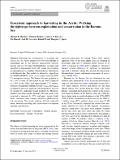Files in this item
Ecosystem approach to harvesting in the Arctic : walking the tightrope between exploitation and conservation in the Barents Sea
Item metadata
| dc.contributor.author | Heath, Michael R. | |
| dc.contributor.author | Benkort, Déborah | |
| dc.contributor.author | Brierley, Andrew S. | |
| dc.contributor.author | Daewel, Ute | |
| dc.contributor.author | Laverick, Jack H. | |
| dc.contributor.author | Proud, Roland | |
| dc.contributor.author | Speirs, Douglas C. | |
| dc.date.accessioned | 2021-09-10T14:30:43Z | |
| dc.date.available | 2021-09-10T14:30:43Z | |
| dc.date.issued | 2021-09-03 | |
| dc.identifier | 275759311 | |
| dc.identifier | 74bd5387-b663-473b-a66c-cd1e6bc119c3 | |
| dc.identifier | 85114177368 | |
| dc.identifier | 000692629800001 | |
| dc.identifier.citation | Heath , M R , Benkort , D , Brierley , A S , Daewel , U , Laverick , J H , Proud , R & Speirs , D C 2021 , ' Ecosystem approach to harvesting in the Arctic : walking the tightrope between exploitation and conservation in the Barents Sea ' , Ambio , vol. First Online . https://doi.org/10.1007/s13280-021-01616-9 | en |
| dc.identifier.issn | 1654-7209 | |
| dc.identifier.other | RIS: urn:B5D0EE7ADAF7FECBA170BD9D5BCA0BE7 | |
| dc.identifier.other | RIS: Heath2021 | |
| dc.identifier.other | ORCID: /0000-0002-6438-6892/work/99804479 | |
| dc.identifier.other | ORCID: /0000-0002-8647-5562/work/99804600 | |
| dc.identifier.uri | https://hdl.handle.net/10023/23946 | |
| dc.description | Funidng: This study was supported by the Changing Arctic Ocean project MiMeMo (NE/R012679/1) jointly funded by the UKRI Natural Environment Research Council (NERC) and the German Federal Ministry of Education and Research (BMBF/03F0801A). Brierley was also supported by ArcticPRIZE (NE/P005721/1). | en |
| dc.description.abstract | Projecting the consequences of warming and sea-ice loss for Arctic marine food web and fisheries is challenging due to the intricate relationships between biology and ice. We used StrathE2EPolar, an end-to-end (microbes-to-megafauna) food web model incorporating ice-dependencies to simulate climate-fisheries interactions in the Barents Sea. The model was driven by output from the NEMO-MEDUSA earth system model, assuming RCP 8.5 atmospheric forcing. The Barents Sea was projected to be > 95% ice-free all year-round by the 2040s compared to > 50% in the 2010s, and approximately 2 °C warmer. Fisheries management reference points (FMSY and BMSY) for demersal fish (cod, haddock) were projected to increase by around 6%, indicating higher productivity. However, planktivorous fish (capelin, herring) reference points were projected to decrease by 15%, and upper trophic levels (birds, mammals) were strongly sensitive to planktivorous fish harvesting. The results indicate difficult trade-offs ahead, between harvesting and conservation of ecosystem structure and function. | |
| dc.format.extent | 15 | |
| dc.format.extent | 1994668 | |
| dc.language.iso | eng | |
| dc.relation.ispartof | Ambio | en |
| dc.subject | Acoustic data | en |
| dc.subject | Chlorophyll | en |
| dc.subject | Climate change | en |
| dc.subject | Ecosystem model | en |
| dc.subject | Fishing | en |
| dc.subject | Food web | en |
| dc.subject | GC Oceanography | en |
| dc.subject | GE Environmental Sciences | en |
| dc.subject | 3rd-DAS | en |
| dc.subject | SDG 13 - Climate Action | en |
| dc.subject | SDG 14 - Life Below Water | en |
| dc.subject.lcc | GC | en |
| dc.subject.lcc | GE | en |
| dc.title | Ecosystem approach to harvesting in the Arctic : walking the tightrope between exploitation and conservation in the Barents Sea | en |
| dc.type | Journal article | en |
| dc.contributor.sponsor | NERC | en |
| dc.contributor.institution | University of St Andrews. School of Biology | en |
| dc.contributor.institution | University of St Andrews. Scottish Oceans Institute | en |
| dc.contributor.institution | University of St Andrews. Centre for Research into Ecological & Environmental Modelling | en |
| dc.contributor.institution | University of St Andrews. Pelagic Ecology Research Group | en |
| dc.contributor.institution | University of St Andrews. Marine Alliance for Science & Technology Scotland | en |
| dc.identifier.doi | 10.1007/s13280-021-01616-9 | |
| dc.description.status | Peer reviewed | en |
| dc.identifier.grantnumber | NE/R012679/1 | en |
This item appears in the following Collection(s)
Items in the St Andrews Research Repository are protected by copyright, with all rights reserved, unless otherwise indicated.

